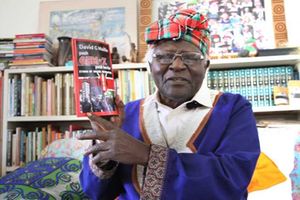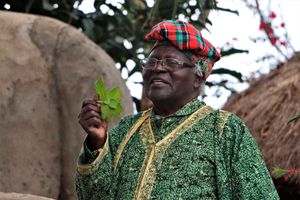
Prof David Maillu during an interview at his home in Nairobi on June 24, 2025.
David Maillu’s no holds barred title After 4.30 is set for release this weekend in a collaboration that features a new publisher, famous artists and a theatrical offering. After 51 years, the text still resonates. Only that it now has a spanking new cover, illustrated by Micheal Soi and Lucy Ade to appeal to today’s reading audiences.
The book will be released as a third edition by new publishing group Mvua Press in Nairobi today (Saturday) with the foreword written by Barrack Muluka. The book is edited by Isaac Mwangi and Will Clurman.
To raise interest, Mvua Press has commissioned screenwriter and producer Nick Njache to create a stage version of the book, which will be on show at the Sarakasi Dome today. Actor and director George Mungai is making a comeback as co-producer following several years in hiatus with Nice Githinji taking on the role of Emili Katongo.
Njache, who has read the text almost 6 times to prepare it for the stage notes that he narrowed it down to certain sections of the book as it is quite wide.
Reading it again, many years after coming across it in University as a text in popular literature, the portrayal of Emili Katango, a commercial sex worker and the dialogue she has with herself and her cousin Lili, a secretary in Nairobi, is fresh. The text, written as poetry, depicts societal problems with its themes of morality, sex, relationships - both in the home and workplace, and women’s exploitation. It throws punches at religious leaders, the high and mighty and security apparatus in their treatment of women.
Women are a dominant theme in many of Maillu’s books who scoffs at the question on how much experience he has with characters like Emili. “One doesn’t have to live in beer parlours to understand the life there, just as people were very surprised to learn I am a teetotaller when I wrote My dear Bottle,” says Maillu.
“Traditional Africa placed a high respect on women but it is my view that today, they are in a more hostile environment than traditional women despite the emancipation they have received,” he notes. He therefore seeks to place value in women, using graphic treatment in his texts to bare their struggles in society.
After 4.30 pushed Maillu to fame and gave him a place among literary greats in the continent.
Mvua Press’ entry is to improve the overall outlook of the books, according to Isaac Mwangi, the editorial manager.
“We recognise there are a lot of interesting self-published books that can be turned into outstanding literary works if given the benefit of a more professional touch,” says Mwangi.
Mwangi says this outfit will work with excellent authors to take their books a notch higher by providing editorial, design and marketing expertise.
This model of publishing is a welcome addition. Some of Maillu’s books could indeed do with an editorial makeover to improve their visual appeal.
Maillu is excited about this collaboration, which he believes will help re-market the books in today’s climate. It is also a welcome endorsement of his texts, which at one time were frowned upon by his contemporaries who believed he did not belong. He has signed five of his books with Mvua, including My dear Bottle and Unfit for Human Consumption, which will be released periodically.
We are seated with Maillu in his home in Langata where he has lived for over 30 years with his late German wife Hannelore who passed away 4 years ago. A good listener with a sprinkle of humour, Dr. Maillu’s mind is sharp and clear at his 86 years.
This year alone, he has completed five books and is working on another title. In 2024, he wrote 10 books, among them, an ode to the Gen Z generation, highlighting their ideals but notes that no bookshop wants to sell it. “They are scared of the Subarus,” he tells me when I prod about the book Push Gen-Z, Push Harder.
Maillu is no stranger to exclusion due to his non-conformist nature. He understands censorship given that his publishing outfit Comb Books was destroyed by the government in the 1970s arising from his subtle criticism of the Kenyatta government and his rising popularity among the Kamba people which threatened some of the politicians.
A scathing letter to the President
It is also the reason why he wrote a scathing letter to the President in 2024, following the decision to close down the Jomo Kenyatta Foundation, publisher of 20 of his titles, 16 being for children.
In it, Maillu argued that African regimes have no interest in investing in publishing and that is the reason why there are very few libraries in the country today.
There is no doubt that Maillu is gifted in many things, something that he attests to often in our discussion. He is also an enigma, someone difficult to read. Maillu also claims to be psychic and actually attempts to read my person while telling me what character I possess. He is mostly right but I am not sure whether this is chance or ability.
The unbeaten path he took to study African philosophy, literature and religion gave him a great advantage over his peers as it allowed him a wider range of thought. Having done his high school certificate by correspondence and the technical knowledge he studied in painting and decorating, he started out his career in Nairobi.
His formal schooling would come later on the nudging of Prof Goren Hyden, a political scientist teaching at the University of Dar es Salaam whom he often interacted with. Prof Hyden was fascinated by the level of knowledge he possessed yet he had very little formal education and encouraged him to formalize this. Dr. Maillu obtained his PhD from St. Clement University in Australia, by correspondence.
Berth Lindfors, one of the pioneers of literary history and criticism in Africa in summarizing his chapter with Maillu wrote, “No one has lavished praise on him, and few admitted finding any redeeming value in what or how he writes....yet Maillu cannot be ignored in any systematic effort to understand the value of East African literature for he has extended the frontiers of that literature farther than any single writer.”
Here is a man who never went beyond high school in the orderly manner of educational hierarchy yet his contemporaries are the recently departed Prof Ngugi wa Thiong’o, Okot P’ Bitek among others. He recalls his encounters with the late Ngugi and their conversations on language.
“It was while working at KBC that I would run into Ngugi at the National theatre. By then I had published my Kikamba poems which I would often read over the radio at KBC and they became popular,” he notes.
Ngugi by then was not writing in his native language and often questioned Maillu on this form of expression and how it made the Kamba people feel. “I questioned him on why he continued writing in English and yet his mother in the village could not understand what he was writing so I challenged him to think of using his native Kikuyu,” says Maillu.
By 1972, he had published his first two books, which were trashed as pornography by many as publishing houses like Heineman were only interested in canonical texts from the continent. Yet his books continued to sell to their amazement. Ngugi would follow in the path of writing in his native Gikuyu at that point with the text Ngahiika Ndeenda.
His thoughts on religion, governance and historical outlook seem far-fetched many times. Before the Gen Z riots came about, Maillu called for the return to African political ideology as the answer to liberate Kenya from chaos and imported political ideology from the masters.
On his website, he called for a social revolution, which would not require millions of shillings or Parliamentary assent, but only education for the masses. Like the seer that wrote After 4.30, this took place in June 2024, and the commemoration only this week Wednesday mirrored what Maillu forewarned.
“Anything that took 70 years to be installed cannot be phased out quickly,” he warns of the need for change in political ideology from Western ideals to African ones. As a political scientist, Maillu believes the damage is too big.
“Our creativity is too low. 60 years after independence, why is it that we cannot make our own bicycles?” he questions.
Maillu harbors political ambitions. He promises a big reveal at the end of this year, noting that though unplanned, the relaunch of this book is the Universe’s organic way of bringing him back to the limelight. And he is ready.






